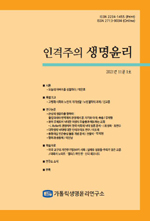Achieving the Right to Health of Immigrants: Focusing on Intercultural Competence
Achieving the Right to Health of Immigrants: Focusing on Intercultural Competence
- 가톨릭생명윤리연구소
- 인격주의 생명윤리
- 14권 2호
-
2024.0733 - 58 (26 pages)
-
DOI : 10.35230/pb.2024.14.2.33
- 58

급속한 국제화로 외국인 이주노동자, 결혼이주여성이 증가하면서 다문화 외국인 환자도 빠르게 늘고 있다. 이주민에게 보건의료서비스를 제공하는 실제 임상 현장에서는 외국인 환자에 대한 선입견, 고정 관념, 차별, 편견, 혐오와 문화적 감수성의 부족, 다양한 질병 신념 체계에 대한 이해 부족 등 여러 의료 윤리의 문제가 제기되고 있으며, 이의 해결을 위한 보건의료 인력의 상호문화 역량의 개발은 시급한 과제라고 할 수 있다. 외국인 환자 진료를 문화적인 배경과 맥락 안에서 효과적이고 적절하게 수행할 수 있도록 하기 위하여, 의료인들이 지속적으로 개발, 노력해야하는 상호 문화 역량은 태도, 인지, 지식, 기술의 여러 측면에서 다루어져야 하며, 의료인들의 실제적인 행동 변화를 이끌어내야 한다. 본 논문을 통해서 상호문화 역량의 개념, 구성요소, 대표적인 문화 역량 과정 모형을 살펴보고 보건의료 인력의 상호 문화 역량 강화가 진료 현장에서 이주민들이 누려야 하는 보편적 인권인 건강권의 달성에 주는 함의 논의의 기틀을 마련하고자 한다.
In the clinical field that provides health care services to immigrants, various medical ethics issues are raised, including discrimination, prejudice, hatred, lack of cultural sensitivity, and lack of understanding of various disease belief systems. The development of intercultural competence of health care workers to resolve this is an urgent task. Within a cultural background and context, care of patients from different cultures can be effectively and appropriately performed. Intercultural competencies of healthcare workers must continuously develop and strive for must be dealt with in various aspects of attitude, cognition, knowledge, and skill. Behavioral changes of health care workers must be brought about. Through this paper, we will examine the concepts, components, and intercultural competency process models, and examine the implications of strengthening the intercultural competence of health care workers for achieving right to health, a universal human right that migrants should have.
Ⅰ. Background
Ⅱ. An understanding of Interculturalism
Ⅲ. Intercultural Competence Model
Ⅳ. Conclusion
(0)
(0)